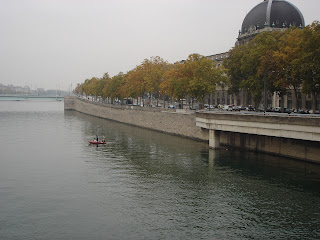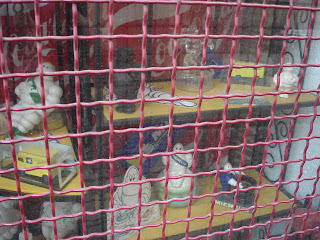Errr...long delay between posts there; sorry about that. I have a whole lot going on right now, both at work and at home, and it's hard to get a few minutes to deliver the type of hard-hitting thought-provoking half-hearted dreck you've come to expect from The Frogmarch.
Anyway, another
French healthcare anecdote: V took Tater to the doctor the other week for his next round of immunizations. While she was there, she mentioned to him that she had been having recurring headaches that just didn't seem to go away. Now, there could be any number of reasons for her to be having headaches, from lack of sleep to stress to food allergies right up to the really scary stuff ("glioblastoma multiforme" just popped into my head)(that was an oncology joke; chuckle ghoulishly). In the US, your primary care provider would probably give you a few things to try, prescribe some pain meds, and if nothing resolved would get you an appointment with a specialist, who would try to rule out some things, etc, etc.
But this being France, V's doctor wrote her a scrip for a spiral CT scan. I made the appointment at the hospital's radiology center, and we were in and out in 30 minutes with a DVD-ROM in hand showing minute slices of the inside of V's brain, thankfully certified free of gliomas and aneurysms and subdural hematomas and other nightmare fuel.
Then I got the bill the other day. It was (pause, deep breath while opening the envelope)... 42 euros.
****************
I've been collecting a list of strange little quirks about everyday French life as they strike me, and while none of them are especially remarkable on their own, together they illustrate how life in a different culture can vary in ways you never expected, and in more ways than you ever expected.
Take writing a check, for example. You do it every day (or maybe every few weeks when you realize you haven't paid any bills recently), and how different can the process be in a foreign country? Well, a check from a French bank has an extra line on it: the first is the amount, written out in words; the second is the "pay to the order of" line, and the third line reads "Fait à:"which literally can mean either "Made at" or "Made to". This puzzled me the first time I wrote a check; I had just written on the previous line whom the check was
Made To! It turns out that in France legal documents are traditionally signed by including the name of the
place the document was completed. So most of my checks say "Fait à Lyon", which now has become habit for me, enough that I mistakenly put Lyon on my checks even when we're in, say, St. Paul de Vence.
Oh yeah, and there's no signature line... one just signs anywhere. Which I often forget to do because there's no visual reminder.
On more thing: the checks are numbered... but the numbers are not sequential. Madness!
*******************
Two French abbreviations you've probably never encountered, and which probably took me too long to figure out:
I kept seeing the letters "A+" at the end of informal e-mails from French colleagues. What the hell? Am I being graded on the quality of my correspondence? It makes more sense if you read it out loud
en français: "Ah ploo." Which happens to be the first two syllables of the expression "à plus tard", or, "see you later".
Along the same lines, if you're going to express the overwhelming depth of your love for someone by spraypainting his/her name on an overpass or carving it into a park bench, the accepted method is to precede the beloved's name with the letters "JTM". Which is read aloud as
Je t'aime.
*************
Office supply oddities:
If I were the type of person to steal office supplies, I might be tempted to swipe a lifetime supply of French folders. These sturdy cardboard envelopes, besides having flaps at the top and bottom of the page to keep your stuff from sliding out the ends, have nifty elastic loops that slip over the open corners of the folder to keep everything shut and secure. You could put a 100-page manuscript in one of these, slip the loops over the corners, and fling the whole thing out the window (in fact, I often do), and when you changed your mind and went downstairs to pick it back up, you'd find everything unharmed and in perfect page order.
But don't get me started on two-hole-punch ring binders. Three holes and three binding rings are how [$deity] intended for our loose-leaf notebooks and technical manuals to be assembled. The rings shall not number
two, unless that number is immediately followed by
three. Four is right out.
****************
Soixante-neuf, le department erotique: Back in the Revolution, along with adopting the metric system and the somewhat-less-useful metric calendar, the visionary founders of La Republique Francaise decided to devide France into administrative
départments, with the list of 100 being alphabetized and each department assigned a sequential two-digit number. Hence Ain is 01, Aisne is 02, etc. On French automobile license plates, the last two digits of the plate number are the department in which the car is registered. I believe the sole purpose of this is that when someone cuts you off on the autoroute, you can spot the "75" on the plate and curse those damned idiot Parisian drivers.
These department numbers can be symbols of local/regional pride or identity, somewhat analogous to area codes in the US (I'm reppin' tha 9-1-9, knowhumsayin', yo?).
Lyon is in the Rhône department, which due to its place in the list is number 69. Now, "69" has the same sexual connotation
in France as it does elsewhere. Still, this doesn't seem to discourage its use--note that calling a phone number listed as "
69 Hotline" is unlikely to result in heavy breathing unless the switchboard operator at the departmental prefecture is having a particularly bad day. I've also seen
69 Lubrification (an oil-change shop),
Hot Jobs 69 (local employment listings) and
69 Seniors (I didn't ask). And it can be a little jarring to see a 10-year-old girl in a t-shirt
with a big "69" on it.
**********
I think I mentioned in a post
in praise of the Lyon Public Library that they have a significant collection of books in English, although novels are grouped by country of origin. That is, in the fiction department there is a section marked Etats-Unis, which has all books by American authors, regardless of whether they are in English or have been translated into French.
Take a look at your nearest bookshelf. Look at the spines of the books: see how the titles are printed to be read from top to bottom (i.e., rotated 90 degrees right)? In reading the titles of a shelf fullof books, you tilt your head to the right. Well, titles of French books are rotated 90 degrees
left. Why? I dunno--it means that if a book is lying flat on a table, the title on the spine is upside-down. But in looking at a bookshelf full of mixed French and English titles, your head flops back and forth like you were
Janice from the Muppets.
I am probably the only person in the world bothered by this.
***********
Rock, paper, scissors...well?
You know the game of
Rock-Paper-Scissors--used as a method to determine who buys the first round, who goes first, who has to ride in the center of the back seat on a road trip, etc. The French version of this game includes a bizarre twist: the addition of a fourth sign, the "Well", made by making a vertical fist with a "hole" in it, like you were pulling an invisible door handle.
The well drowns the scissors and the rock, but can be covered by the paper. Think about that for a minute: in the classic R/P/S game, each sign is equally powerful, being superior to one of the others and inferior to one of the others. But adding another means that two signs (the Well and the Paper) are each superior to
two of the others (Well beats Scissors and Rock; Paper beats Rock and Well), creating a hierarchy, or class system if you prefer, of haves and have-nots. Thought-provoking commentary on the inequalities of the capitalist system, or maddening twist merely to be difficult?
The effect on strategy is profound: Since Well beats two of the three others, it is the obvious choice to begin with. Of course, that is exactly what your opponent will be thinking, which is why you must begin by throwing Paper. Of course, knowing this, your opponent will throw Scissors, so of course Rock, lowly Rock which only beats one other, is the only logical play. Unless your opponent anticipates this and opts for Well, in which case...
[self-defenestrates]
A+
 Saturday morning, the Pont Wilson bridge near our place was closed to traffic, the underground parking garage vacated, and the riverbanks on both sides cordoned off... as the Gendarmerie bomb squad raised an unexploded 1100-pound bomb from the Rhône under the bridge.
Saturday morning, the Pont Wilson bridge near our place was closed to traffic, the underground parking garage vacated, and the riverbanks on both sides cordoned off... as the Gendarmerie bomb squad raised an unexploded 1100-pound bomb from the Rhône under the bridge. background of the top photo is caddy-corner across Place de la Republique from our building. In other words, we've walked right over the top of this huge high-explosive device a couple hundred times. Geeesh! Step lightly... Actually, according to the Le Progres article, there was no danger since the detonator had long since deteriorated in the course of its 63 years underwater.
background of the top photo is caddy-corner across Place de la Republique from our building. In other words, we've walked right over the top of this huge high-explosive device a couple hundred times. Geeesh! Step lightly... Actually, according to the Le Progres article, there was no danger since the detonator had long since deteriorated in the course of its 63 years underwater. started work at first light, by the time I wandered out at about 10AM, everything had been cleaned up and there was only this lonely dive boat looking for--I dunno, maybe any other half-ton bombs no one had noticed.
started work at first light, by the time I wandered out at about 10AM, everything had been cleaned up and there was only this lonely dive boat looking for--I dunno, maybe any other half-ton bombs no one had noticed.
 **********************
**********************










